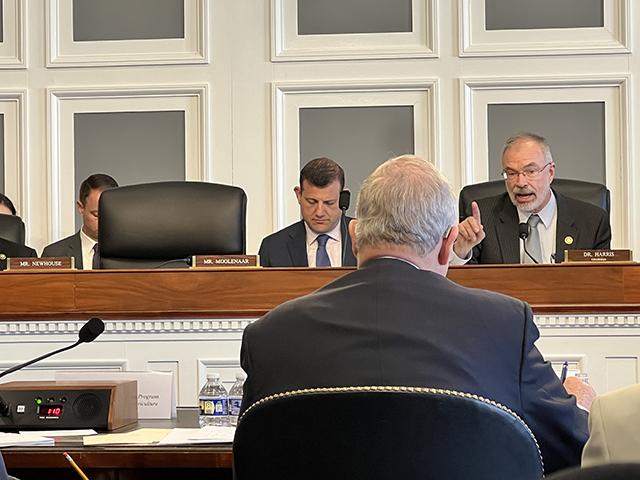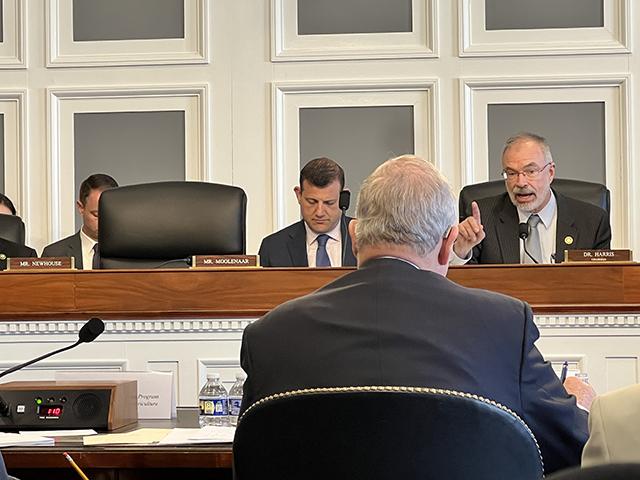Ag Policy Blog
Congress Wants to Both Restrict USDA's CCC Fund and But Also Use It
Agriculture Secretary Tom Vilsack faced some criticism Thursday over how USDA uses the Commodity Credit Corp. (CCC) as a slew of lawmakers then called on USDA to use the fund to help producers in their districts.
Vilsack testified before the House Appropriations Subcommittee for Agriculture about USDA's discretionary funding request for Fiscal Year 2025.
Rep. Andy Harris, R-Maryland, chairman of the subcommittee, characterized that the CCC under the Biden administration "continues to be treated like a slush fund." Republicans have been especially critical of USDA using $3.1 billion under the fund for a pilot program on climate-smart agriculture in 2023.
Pointing to comments that Vilsack has made about Congress consider how the CCC fund could be used to help commodity programs, Harris said Vilsack continues looking for ways to spend money outside the regular farm bill process. "I'm perplexed as to how USDA would be able to do this as establishing reference prices and farm programs is done by Congress."
Vilsack later sought to correct Harris, saying he never suggested using CCC funds outside of the farm bill. "What I did say was, in order for us to have a farm bill, it's going to be necessary for members of the Ag committee to be creative on how they could use the resources within the CCC at their instruction and direction to provide the relief and assistance they are looking for to bolster the safety net."
Then subcommittee members on both sides of the aisle took turns asking for USDA to provide different forms of aid to farmers.
Rep. Sanford Bishop, D-Ga., the subcommittee's ranking member, pointed to farmers struggling from higher input prices. Bishop said he had heard from peanut and cotton farmers from Georgia and he asked if Vilsack would support a one-time payment for peanut and cotton producers -- money that would come from the CCC. Bishop noted there was a $250 million appropriation for a one-time payment for rice farmers in 2022.
Rep. David Valadao, R-Calif., then pointed to a $12 million payment to Puerto Rican dairy farmers in 2017 under the Trump administration. He pointed to federal disaster aid for flooding last year adding, "for some reason dairy has been left out" and dairy farmers don't qualify for some of the aid. He asked Vilsack why CCC couldn't be used for California dairy farmers.
P[L1] D[0x0] M[300x250] OOP[F] ADUNIT[] T[]
"If one secretary was able to do that and no one challenged it, why is this different?" Valadao said.
For the CCC to work, Vilsack said, USDA has to stay within the charter. Anytime he uses the CCC, Vilsack said he asks USDA's general counsel if it is allowed in the charter. Vilsack pointed to purchases of milk and pork for school programs as one way the CCC is used. Vilsack also cited that use of the CCC fund under the Trump administration was so high Congress had to approve a provision to replenish the fund.
Valadao pointed to lower prices for some California commodities that could use CCC purchases of commodities to help prices.
Rep. Marcy Kaptur, D-Ohio, later asked about finding more ways to use USDA programs to use more local agricultural products for direct marketing to schools. Talking about local farmers, Kaptur said, more local farms should be given contracts for linking farmers to programs that buy a lot of foods. "Why couldn't we work more closely with local schools to develop pilot programs so they could directly connect with the apples grown in our region?"
The secretary then rattled off different funding purchases and programs out there for food banks and farm-to-school programs.
Rep. Julia Letlow, R-La., described that the crawfish industry in her state "is on life support with no safety net." Production has dropped as much as 90% for crawfish producers and Letlow would like USDA to provide some relief. Letlow said crawfish production is a $300 million industry in Louisiana. Letlow wanted a commitment from Vilsack to provide some assistance.
Rep. Jerry Carl, R-Ala., then sought some aid to help shrimp producers in the state because the country is being flooded with cheaper shrimp imports. Carl wants to see if USDA can use Section 32 authority to use CCC dollars to buy shrimp for school lunch programs. Vilsack noted when it comes to Section 32, "For every dollar we have, we have $2 in demand."
Rep. Barbara Lee, D-Calif., also raised the need for more support for urban farming. Vilsack mentioned appropriators cut funding for urban agriculture in the FY 2024 budget passed earlier this month.
The Republican Study Committee, which released a proposed FY 2025 budget on Wednesday, called for requiring "any action by the Commodity Credit Corporation (CCC) to have congressional approval."
The full hearing can be viewed here: https://appropriations.house.gov/…
Chris Clayton can be reached at Chris.Clayton@dtn.com
Follow him on X, formerly known as Twitter, @ChrisClaytonDTN
(c) Copyright 2024 DTN, LLC. All rights reserved.






Comments
To comment, please Log In or Join our Community .